Global
Copyright@ Australian Catholic University 1998-2026 | ABN 15 050 192 660 CRICOS registered provider: 00004G | PRV12008
Copyright@ Australian Catholic University 1998-2026 | ABN 15 050 192 660 CRICOS registered provider: 00004G | PRV12008
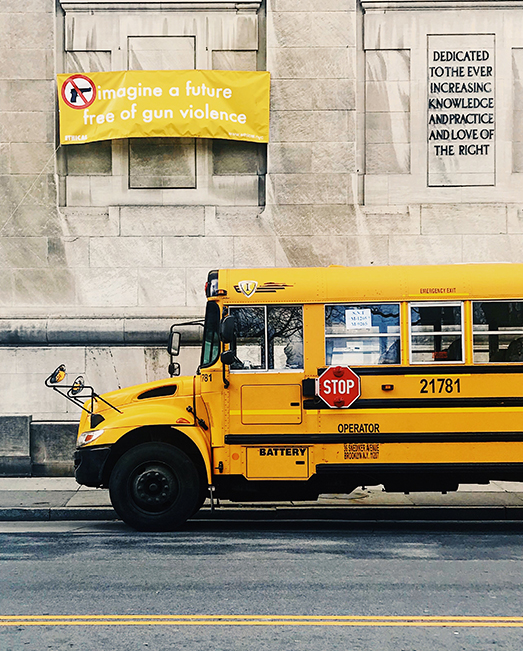
Why does tighter gun control continue to elude the United States, despite regular mass shootings, each leading to a period of national soul searching? The complex answer includes the influence of the powerful gun lobby, the widely publicised ‘culture wars’ in the US, and the fact that firearms have been embedded in American society and culture for a very long time. We spoke to US expert Michael Ondaatje, Professor of History and National Head of ACU’s School of Arts, to help us better understand America’s attitude towards guns.
“I am not sure it is right to say that ‘America’ has a ‘blind spot’ when it comes to guns, but there certainly is a gun problem in the US, and this problem needs to be discussed openly and rationally if the goal is to reduce gun violence through gun reform.
Unfortunately, I don’t see such a discussion being possible today. Every time there’s a gun massacre in the United States, the response is more or less the same. People express shock and horror, offer sympathy to the families of the victims, and pledge to keep them in their prayers. Liberals and those on the left of politics demand ‘gun reform now’, while conservatives or those on the right of politics caution that ‘this is not the time to politicise tragedy’ and insist that, if anything, the nation needs more guns in the ‘right’ hands. Insults are hurled by both sides, with hyperbole substituting for serious dialogue, and soon any hope of achieving reform evaporates.
In many respects, the gun ‘debate’ reflects the wider polarisation in US political culture. Legitimate competing interests on the other side of any debate are barely tolerated; politicians and political activists typically assume the worst about their opponents (they are not just ‘wrong’, they are ‘evil’, and must be crushed); and there is relentless shouting about problems, but rarely, if ever, a pragmatic way forward to achieve solutions. This is certainly the case when it comes to guns and gun laws in America.”
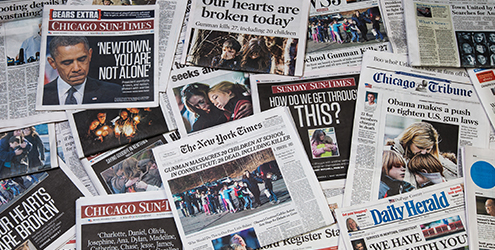
Media following the 2012 Sandy Hook school shooting.
“Guns are a major problem in America because they facilitate killing, and a lot of it. Since 1960, nearly 1.5 million Americans have died from guns, either in homicides, suicides or accidents. Every year twice as many Americans lose their lives to guns than die in terrorist attacks around the world. Mass shootings, likes the recent ones in Las Vegas and Florida, invariably capture the most public attention, but these shootings account for only a tiny fraction of gun-related deaths in the United States.
In fact, most gun victims die in non-mass shootings that occur daily in communities across the country.
This is the real tragedy – how normal and ‘every day’ gun violence has become in the US, particularly in poor urban areas.
To outsiders looking in on America, the problems seem obvious – far too many guns in circulation (300 million) and inadequate gun laws. The solutions also appear obvious: reduce the number of guns and tighten gun laws. But the history of guns in America is long and complicated, and this history has been tied up in larger debates over American identity and patriotism. Many see reducing gun violence as a moral imperative, but doing this won’t be easy, knowing what we know about American history.”
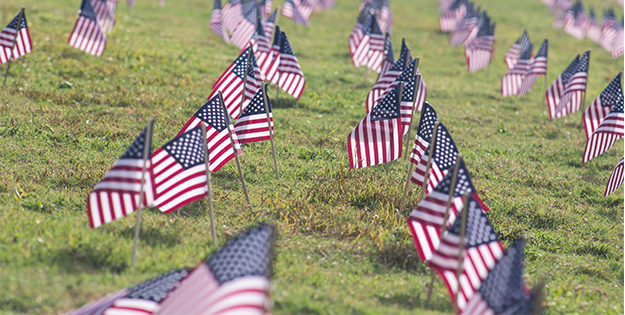
“For many Americans, guns are a fundamental part of the American experience (think: War of Independence, Civil War, Frontier) and the right to own a gun is seen as connected to core American values like individualism and personal liberty.
Today’s gun rights activists see themselves as heirs to the American Revolution, vigorously defending the Constitution against ‘left-wing forces’ seeking to restrict individual liberty broadly, and the right of the people to bear arms specifically.
The National Rifle Association (NRA) is the major gun rights advocacy organisation in the country, with a membership of 5 million and an annual budget in excess of $300 million. Since the early 1970s, the NRA has been remarkably successful at promoting the view that gun regulation of any kind threatens the freedom of American citizens and will lead to ‘tyrannical’ government.
Before the 1970s, the NRA’s position was not so rigid. NRA presidents actually supported gun regulation and as late as 1968 the organisation was promoting ‘gun safety’ and helping President Lyndon Johnson pass the Gun Control Act. The question we need to ask is: what changed? To understand the issue of guns in modern America, the primary focus needs to be on the ‘culture wars’ of the past 50 years. Politics has been – and continues to be – the greatest impediment to gun reform.”
“Before the 1970s NRA advocacy around the Second Amendment (‘the right to keep and bear arms’) was rare, but in the late 1960s concerns about rising crime led increasing numbers of citizens to purchase guns for protection, and the NRA rallied behind them and gave expression to their anxieties. By the mid-1970s faith in government was at an all-time low, and there was heightened paranoia that the government was plotting to take away people’s guns.
There was also a wider conservative backlash against liberalism and the ‘excesses’ of the 1960s. The rise of anti-government sentiment and anti-liberal sentiment, together, propelled the NRA to a powerful position in American politics. Guns essentially became a symbol of a larger political fight.”
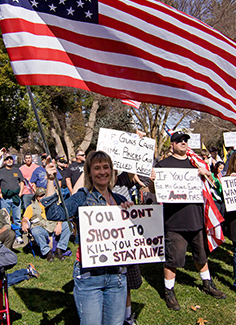
“In some respects, I am not overly optimistic. In recent years the explosion of mass shootings has not led to gun reform, despite strong support from President Obama. It was the Sandy Hook massacre of 2012 that reinforced to me how difficult it would be to secure reform: if the mass slaughter of children isn’t enough, then what will it take? Sandy Hook was a ‘turning point’ where history failed to turn. President Trump is part of the problem, not the solution. The NRA donated $30 million to his election campaign and since becoming president he has signalled to them that they have ‘a true friend and champion’ in the White House. The NRA is a formidable outfit that won’t be defeated easily. They are relentless on this issue and they know how to win. For years now, they have debated, lobbied and electioneered more effectively than gun reform activists.
But it’s not all doom and gloom. Gun ownership in the US is dropping significantly. Support for stricter gun control is at an all time high, with more than 90% of Americans expressing support for universal background checks.
A social movement has emerged in the aftermath of the Parkland massacre – led by survivors – and has broken through where previous protests have failed. But in the years ahead gun control activists will need to do more than march. They will need to be pragmatic and strategic. They will need to recognise that not all gun rights supporters are extremists and that compromise is possible and crucial. In the short term, gun reform activists should forget about banning assault weapons – that is not an argument that they are going to win – and instead focus their energies on background checks and stricter gun safety regulations. They should speak for Americans, not against gun owners, leveraging the nation’s changing demographics more effectively than they have up to now. More minority citizens, increasing urbanisation and growing numbers of Americans in higher education will mean stronger support for gun control in the years ahead.”
“I don’t want to take anything away from John Howard. For his leadership on this issue he deserves the highest praise. He stood up to Australia’s gun lobby and members of his own party to push through (what turned out to be) a very successful gun law reform package. But the situation is very different in America, where the historical commitment to guns is much stronger and there is a mass guns rights movement spearheaded by the NRA. There is no Australian solution to this uniquely American problem. Change will have come to come from within America.”
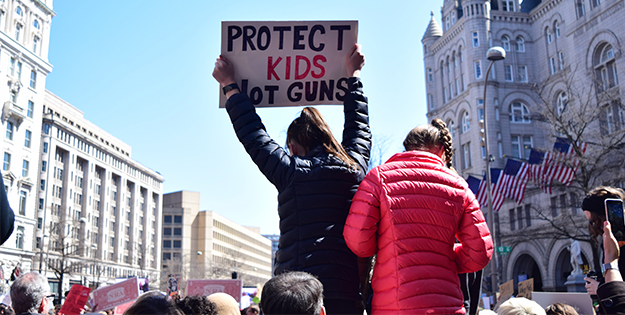
“If a Trump presidency is possible, then an Oprah candidacy certainly is, but whether this is desirable is another matter. Some like to say she’s everything he’s not (she’s black, a woman and she likes to read), but I’m not convinced that America’s interests will be best served by another celebrity president outsider. An Oprah candidacy would be exciting – no doubt about it – but I increasingly prefer politics to be light on the ‘excitement’ and heavy with pragmatic policy proposals. It’s not as if there aren’t challenges to address. How to rebuild trust and restore faith in institutions? How to counter the tribalism and authoritarianism on the right and the left? How to reinvigorate liberal democracy? Trump offers no solutions, but who are the Republicans and Democrats offering serious responses to contemporary challenges? Americans – and the world – need these people to stand up.”
Michael Ondaatje is a Professor of History and Head of ACU’s National School of Arts. He is an expert in American political history, with a particular focus on conservatism, foreign policy and presidential elections.
Copyright@ Australian Catholic University 1998-2026 | ABN 15 050 192 660 CRICOS registered provider: 00004G | PRV12008